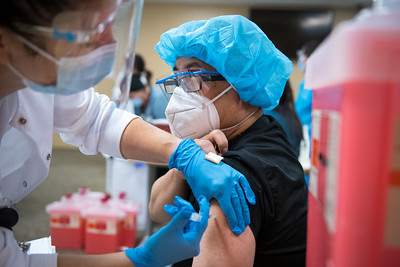
THIS week hit a sobering milestone. President Joe Biden marked 500,000 American deaths with a moment of silence at sunset last Monday, February 22, the National Public Radio reported. He also ordered flags on all federal buildings lowered to half-staff for five days.
But we have reasons to be optimistic about the United States’ war against COVID-19. Cases, hospitalizations and deaths are on a downward trend. On Thursday, February 25, Biden “commemorated 50 million COVID-19 vaccine doses administered since he took office, using it as a measuring stick against his promise to put 100 million shots in people’s arms in his first 100 days.”
But the president isn’t celebrating yet and has warned there’s “a long way to go” before life will return to normal.
“The more people get vaccinated, the faster we’re gonna beat this pandemic,” Biden said in the CNN report. “We’re moving in the right direction, though, despite the mess we inherited from the previous administration, which left us with no real plan to vaccinate all Americans.”
This news will mostly impact our healthcare workers fighting on the frontlines, including our very own kababayans — especially our Filipino nurses. These modern-day heroes are the most impacted by the pandemic as they unselfishly serve beyond the call of duty to save the lives of others.
“Filipino and Filipino American nurses are dying from COVID-19 at disproportionately high rates, accounting for more than 30% of the 205 U.S. nurses who have died, though the group makes up just 4 percent of the total nurse workforce”, according to The Mercury News.
More than two-thirds of nurse deaths in California are among Filipino Americans, the Mercury News reported in October. “California, where about 20% of nurses identify as Filipino, they account for 11 of the 16 COVID-19 deaths in the profession, or nearly 70%”, according to the California Nurses Association.
Why is this happening and what can be done?
Here are two perspectives from community leaders privy to the plight of our nurses:
Zenei Cortez, RN, President of National Nurses United
“Majority of our Filipino nurses work in a critical and acute care units — areas where the sickest of Covid positive patients are placed. They tend to work long hours as well. So the rate of exposure to Covid patients is high. Filipino nurses are so dedicated and compassionate so that if there is a need for anyone to work OT, they take it.
Our kababayans take the OT because they do not want to leave their co workers short. They do not want the patients to be without nurses. Because we treat our patients like family, Filipino nurses go over and beyond the call of duty. Every shift, they risk putting themselves in harm’s way. Filipinos in general, are prone to high blood pressure, high cholesterol, diabetes or other heart problems. Some of our nurses might have these pre-existing conditions that put them in higher risk or danger of getting infected.
We are a year into this pandemic and we still need adequate personal protective equipment. We still need safer work environments and safe staffing. We need a federal temporary emergency OSHA mandate to protect us, so that our employers will be obligated to set up safety guidelines and protocols.
Filipino nurses respect authority. We do not question authority. We do not like conflicts. Hospital administration and managers know this and they take advantage of it.
We’ve been ordered to “reuse” single-use disposable masks. Imagine using the same mask for the entire shift of 8/10/12 hours. Some of these single-use disposable masks have gone through a decontamination process ( chemical process ) so that when it circles back to the nurses for re-use, the elastic breaks, the fit is not right and we are inhaling the chemicals that were used. Just imagine being inside a Covid patient’s room and your mask falls off! There has been [a] lack of waterproof gowns and head covers and shoe covers as well.
Last year, early in the pandemic, we’ve been very vocal about what we need. We were literally begging for protective gear, so we can do our jobs safely. We were ignored and dismissed as a bunch of whiners. And that was when we lost a lot of our kababayans, and we continue to lose a few.
Together with Filipino nurses and others across the country, we’ve been fighting for adequate PPE, safe staffing and safer work environment. Our Filipino nurses have started to be more vocal and assertive in fighting for their rights. We’ve lobbied President Biden on our issues. He has invoked the Defense Production Act, so that manufacturing of PPE happens at a much faster rate. He has increased access to rapid Covid testing, robust contact tracing and notification and of course massive vaccination of all nurses, frontliners and the public.
Nurses will continue to educate the public on all precautionary principles even if vaccinated. We will not stop advocating for our patients, our communities and ourselves.
Atty. Arnedo Valera, US immigration lawyer, current pro bono legal counsel of the Philippine Nurses of America Foundation (PNAAF) and former Legal Counsel of the Philippine Nurses Association of America (PNAA)
Based on my in-depth discussions with many of my nurse immigration clients in my capacity, as many of these nurses are working in different health care facilities especially nursing homes, I have discovered that a higher number of Fil-Am nurses are highly specialized and or are trained to work in high-risk units: ICUs, ERs in hospitals; nursing homes, long term care and even [in] private homes especially traveling nurses.
Fil-Am nurses work a lot of overtime in ICUs, doing two shifts back to back most of the time on a daily basis if not on 12 hours shift for 3 or 4 consecutive work days. And they have much longer exposure with COVID infected patients. And of course, studies have shown that lack of sleep affects and compromises one’s immune system.
What is also very evident is that agencies recruit Filipino nurses to work mainly in Intensive Care Units and in nursing homes.
There are also a number of Filipino nurses who work in warm and humid states, and that Fil-Am nurses find it very uncomfortable wearing masks.
The most difficult part is the “cultural belief” ingrained in some Fil-Am nurses has always maintain: ”Hindi ako papabayaan ng Diyos,” and they disregard basic healthcare protocols.
And there are even Fil-Am nurses, who because of their political belief as a die-hard Republican, continue to enjoy socializing with friends, going out to eat outside of work as if they have a feeling of invincibility. Until the inevitable happens and they get infected and die. But unfortunately, [the] virus has also been transmitted to a family member.
But what is profoundly admirable are the nurses who are so highly dedicated and committed in their work, that when there is a shortage of nurses, they heroically take over the front lines to cover shifts and risk their lives for their patients and for their facilities they worked at.
Even among health care workers, education remains the strongest weapon. It is great that many of our Fil-Am nurses in the frontlines are now vaccinated, but this COVID-19 pandemic has changed the landscape of the nursing profession. Caring for their COVID-19 infected patients has become a death sentence. Until this pandemic is eradicated, we can only mitigate and minimize the dangers they face. Fil-Am nurses will continue to play heroic roles to save lives and strengthen our health care system even at the expense of offering their lives so that others may live.
* * *
The opinions, beliefs and viewpoints expressed by the author do not necessarily reflect the opinions, beliefs and viewpoints of the Asian Journal, its management, editorial board and staff.
* * *
Gel Santos Relos has been in news, talk, public service and educational broadcasting since 1989 with ABS-CBN and is now serving the Filipino audience using different platforms, including digital broadcasting, and print, and is working on a new public service program for the community. You may contact her through email at [email protected], or send her a message via Facebook at Facebook.com/Gel.Santos.Relos.





